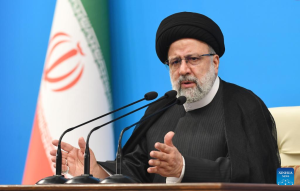The BRICS bloc, representing the emerging Global South, will “erode Western leadership”, signifying a shift toward a more equitable global transition, according to a leading scholar in the field of economic geography from the United Kingdom.

“The realization that has to descend on the people in the advanced Western countries who still remain relatively rich and privileged in our world is that these developments will certainly erode the Western leadership by actually increasing the relative weight of the Global South but that just means the movement in the direction of a fairer, more democratic system in which all voices count, rather than only a few voices count,” said Michael Dunford, emeritus professor at the University of Sussex and visiting professor at the Institute of Geographical Sciences and Natural Resources Research of the Chinese Academy of Sciences.
Dunford made the remarks in an interview with China Daily, while commenting on the role of BRICS in a West-led world. BRICS is acronym of five major emerging economies of Brazil, Russia, India, China and South Africa.
The bloc recently concluded its 15th summit in Johannesburg, South Africa, on Aug 24. The summit achieved a series of fruitful outcomes aimed at strengthening South-South cooperation, with particular attention given to its historic expansion.
Six more countries, including Argentina, Egypt, Ethiopia, Iran, Saudi Arabia and the United Arab Emirates were invited to join the organization, and their membership will take effect from Jan 1.
Within a global system that has long been dominated by the West, developing countries have encountered many obstacles from the Global North, thus BRICS is a constructive attempt made by the Global South to better serve their own interests, said Dunford.
“For example, if you look at the international use of the dollar, it effectively gives the United States a credit card with no expenditure limit and no repayment date, which is an extraordinary privilege. And to some extent, the Euro provided the European Union with similar privileges,” he pointed out.
“Then this dollar system is used to weaponize, sanction countries whose courses of action are not approved by the US and Europe. These countries are also trying to impose their own moral, economic, political and cultural values on the entire world.”
The BRICS countries emphasized the importance of “encouraging the use of local currencies in international trade and financial transactions between BRICS, as well as between their trading partners,” as stated in the Johannesburg II Declaration adopted at this year’s summit.
And for the Global South and the rest of the world, it means they now have more choices in a changing world, which increases their ability to negotiate, said Dunford.
“And in that context, they have tried to emphasize values, that, in a sense, should be shared values of humankind, about the right to choose one’s course of development, about respect for other civilizations, about openness and inclusiveness, rather than creating small groups or the imposition of the view of the few,” he said.
“What the Western world should do, is try to put its own house in order, because it has a lot of internal issues that it has to confront, but it should try to put it in order in a way that does not depend on establishing unfair relationships with other parts of the world.”

